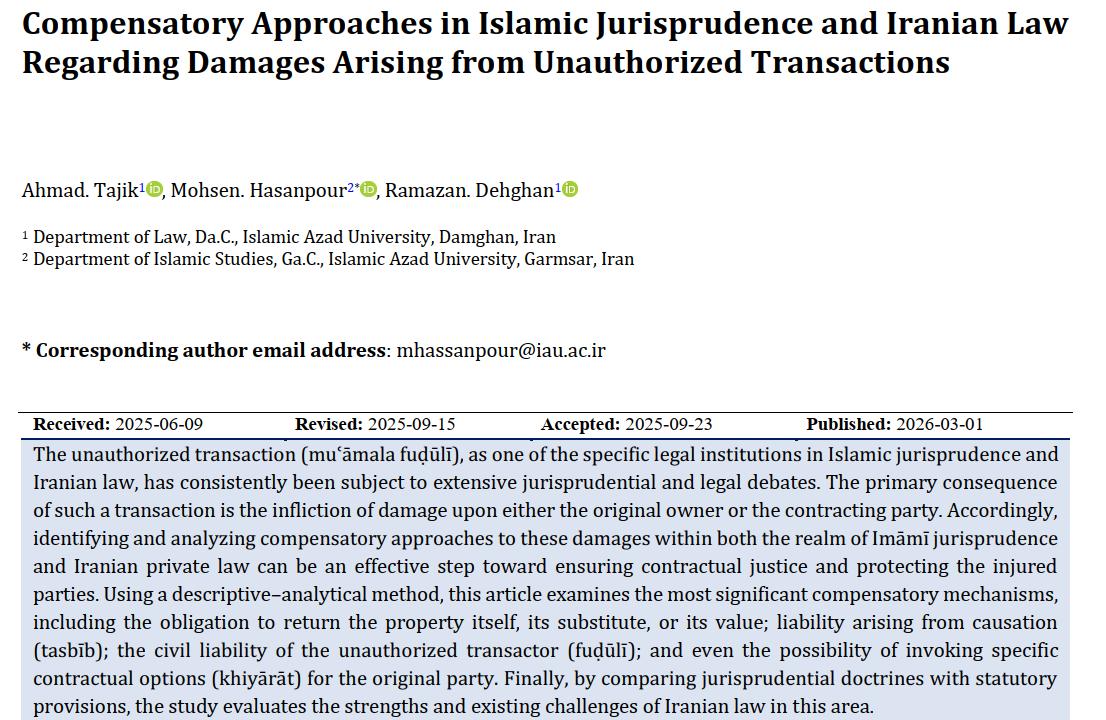Compensatory Approaches in Islamic Jurisprudence and Iranian Law Regarding Damages Arising from Unauthorized Transactions
Keywords:
Unauthorized transaction (muʿāmala fuḍūlī), damage, Imāmī jurisprudence, private law, strict liability (ḍamān qahrī)Abstract
The unauthorized transaction (muʿāmala fuḍūlī), as one of the specific legal institutions in Islamic jurisprudence and Iranian law, has consistently been subject to extensive jurisprudential and legal debates. The primary consequence of such a transaction is the infliction of damage upon either the original owner or the contracting party. Accordingly, identifying and analyzing compensatory approaches to these damages within both the realm of Imāmī jurisprudence and Iranian private law can be an effective step toward ensuring contractual justice and protecting the injured parties. Using a descriptive–analytical method, this article examines the most significant compensatory mechanisms, including the obligation to return the property itself, its substitute, or its value; liability arising from causation (tasbīb); the civil liability of the unauthorized transactor (fuḍūlī); and even the possibility of invoking specific contractual options (khiyārāt) for the original party. Finally, by comparing jurisprudential doctrines with statutory provisions, the study evaluates the strengths and existing challenges of Iranian law in this area.
Downloads
References
Ansari, M. (2019). A Jurisprudential and Legal Analysis of Civil Liability Arising from Unauthorized Transactions. Quarterly Journal of Jurisprudential and Legal Research, 5(3).
Ansari, M. H. (2019). Al-Makasib (The Earnings) (Vol. 4). Imam Khomeini Education and Research Institute.
Emami, G. (2017). Civil Law - Obligations (Vol. 1). Dadgostar Legal Publishing Institute.
France. (1804). Code Civil français (French Civil Code).
Germany. (1900). Bürgerliches Gesetzbuch (BGB) [German Civil Code].
Islamic Republic of Iran. (1960). Civil Liability Law of the Islamic Republic of Iran.
Islamic Republic of Iran. (1961). Registration of Deeds and Real Estate Law.
Islamic Republic of Iran. (1962). Civil Code of the Islamic Republic of Iran.
Judiciary's Legal Deputy. (2002). Advisory Opinion No. 71841.
Katouzian, M. R. (2018). General Rules of Contracts (Vol. 2). Mizan Publishing.
Katouzian, N. (2012). General Rules of Contracts. Mizan Publishing.
Majlisi, M. B. (1981). Jawahir al-Kalam (The Jewels of Speech) (Vol. 37). Dar al-Kutub al-Islamiya.
Safaei, S. H. (2017). Civil Liability. University of Tehran.
Shahid Thani, M. i. H. (2020). Masalik al-Afham (Paths of Understanding) (Vol. 2). Dar al-Mustafa Publications.
Sheikh Hurr, A. (1979). Wasa'il al-Shi'a (Means of the Shi'a). Islamiya Publications.
Supreme Court of Iran. (1984). Unifying Verdict No. 31.
Supreme Court of Iran. (1997). Unifying Verdict No. 620.

Downloads
Additional Files
Published
Submitted
Revised
Accepted
Issue
Section
License
Copyright (c) 2025 Ahmad Tajik, Mohsen Hasanpour, Ramazan Dehghan (Author)

This work is licensed under a Creative Commons Attribution-NonCommercial 4.0 International License.





